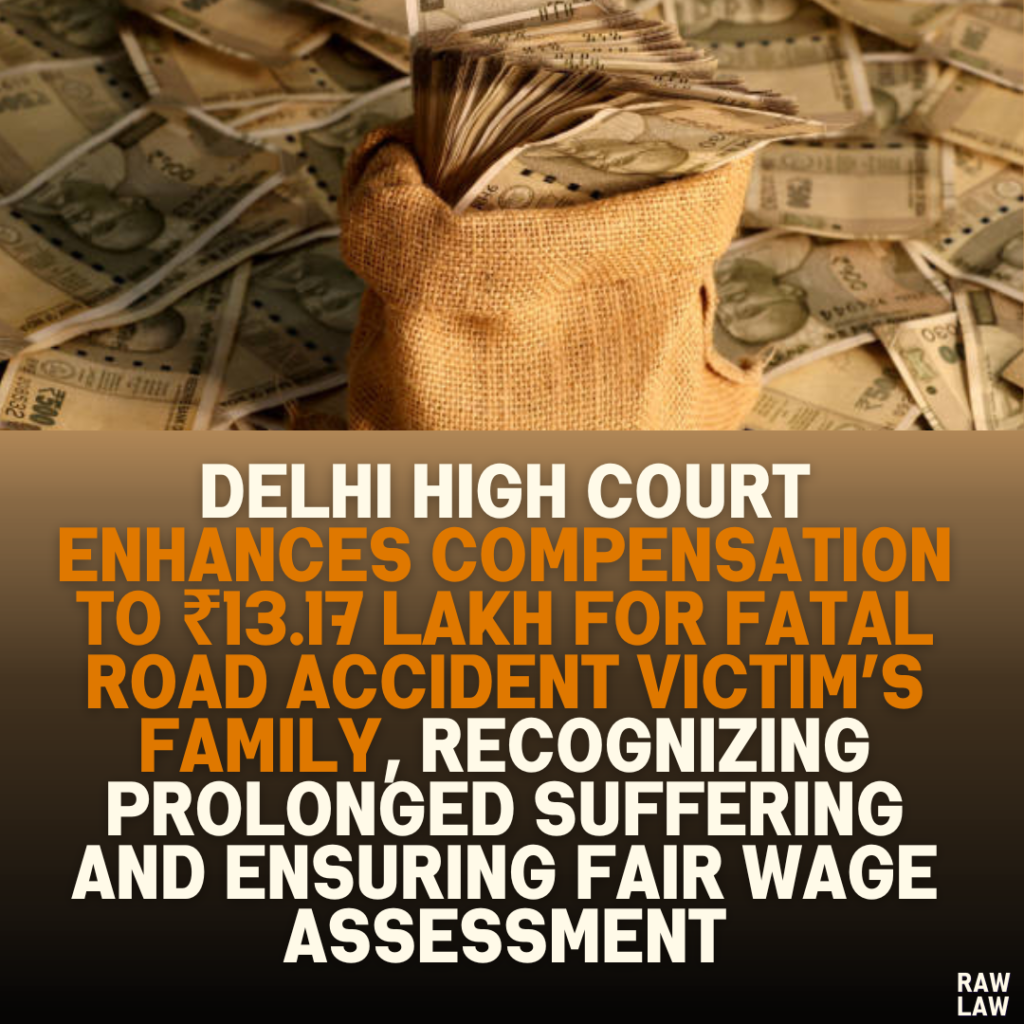Court’s Decision:
The Delhi High Court increased the compensation awarded to the claimants (family of the deceased) from ₹7,49,000 to ₹13,17,000, with an interest rate of 9% per annum. The court arrived at this amount by:
- Considering the higher minimum wages applicable to a matriculate in Rajasthan.
- Factoring in the three years of suffering endured by the deceased due to his injuries.
- Applying a multiplier of 16 (based on his age at death).
- Adjusting non-pecuniary damages like pain and suffering and loss of consortium.
The court also directed the insurance company to deposit the enhanced compensation within four weeks for disbursal to the claimants.
Facts:
- The deceased, Suresh Chand, was injured in a road accident on July 27, 2008, when a rashly driven tempo hit his bicycle. He suffered severe injuries and remained bedridden for over three years.
- Despite treatment, he succumbed to his injuries on October 4, 2011.
- The initial compensation of ₹18,05,141 (awarded for injuries) was later reduced to ₹7,49,000 after the tribunal reconsidered the case to account for his death.
- The deceased’s family appealed for enhancement, arguing the reduced compensation was insufficient and did not account for the deceased’s prolonged suffering, proper wage assessment, and other losses.
Issues:
- Income Assessment: Should the deceased’s income be assessed based on Delhi’s minimum wages (where the accident occurred) or Rajasthan’s minimum wages (his place of residence)?
- Multiplier: Was the tribunal correct in applying a multiplier of 16, or should it have applied 17 based on his age?
- Deductions for Personal Expenses: Was it appropriate to deduct 1/3rd of the deceased’s income for his personal expenses?
- Non-Pecuniary Damages: Should compensation under heads like pain and suffering, and loss of consortium, be enhanced?
- Interest Rate: Should the interest rate on the compensation be increased from 9% to 18% per annum?
Petitioner’s Arguments:
The claimants argued:
- Income Miscalculation: Since the accident occurred in Delhi, the deceased’s income should have been assessed based on Delhi’s minimum wages, which are higher than Rajasthan’s.
- Multiplier Issue: The tribunal applied the wrong multiplier. As per the deceased’s age (31 years at the time of death), a multiplier of 17 was appropriate.
- Non-Pecuniary Damages: Pain and suffering for three years were not adequately compensated, and consortium should be calculated individually for each family member.
- Interest Rate: The interest rate of 9% per annum was too low and should be enhanced to 18%.
Respondent’s Arguments:
The insurance company contended:
- The tribunal fairly assessed the deceased’s income and compensation based on Rajasthan’s minimum wages since there was no evidence of the deceased working in Delhi.
- The deductions and calculations were in accordance with legal principles.
- The appeal for enhancement lacked merit.
Analysis of the Law:
- Income Assessment:
- The court found no evidence of the deceased working in Delhi, such as employment records or employer details.
- The deceased’s documents, including the matriculation certificate, were from Rajasthan, and his permanent address was also in Rajasthan.
- Thus, Rajasthan’s minimum wages were applied but at the higher rate for matriculates.
- Multiplier:
- As per the deceased’s age at the time of death (31 years), the correct multiplier was 16. The court upheld this, rejecting the claimants’ argument for a multiplier of 17.
- Pain and Suffering:
- The court acknowledged that the deceased endured three years of pain due to complete paralysis (100% permanent disability).
- It enhanced the compensation for pain and suffering to ₹1,00,000.
- Loss of Consortium:
- The tribunal awarded a lump sum of ₹40,000 for loss of consortium. However, the court ruled that each of the deceased’s three dependents (wife and parents) deserved ₹40,000 each, increasing the amount to ₹1,20,000.
- Loss of Income:
- The deceased’s treatment period (38 months) was considered, and compensation for loss of income was calculated as ₹1,55,078.
Precedent Analysis:
No specific judgments were cited in the judgment. The court relied on established principles of compensation assessment under the Motor Vehicles Act, 1988.
Court’s Reasoning:
- Rajasthan’s minimum wages were applied correctly since the deceased’s employment in Delhi was unproven.
- The court emphasized the prolonged pain and suffering endured by the deceased, justifying higher non-pecuniary damages.
- It clarified that deductions and the multiplier applied were in accordance with legal standards.
Conclusion:
The court recalculated the total compensation as follows:
- Loss of Financial Dependency: ₹7,31,315.2
- Loss of Consortium: ₹1,20,000
- Loss of Income: ₹1,55,078
- Pain and Suffering: ₹1,00,000
- Other Heads: Retained at tribunal’s values.
The total compensation was rounded off to ₹13,17,000, with a 9% interest rate.
Implications:
- Fair Wage Assessment: This judgment reinforces the need for appropriate wage assessment based on evidence of employment location.
- Enhanced Damages for Suffering: It underscores the court’s acknowledgment of prolonged suffering and its impact on compensation.
- Comprehensive Consortium: The judgment highlights the importance of compensating dependents individually for their loss.
